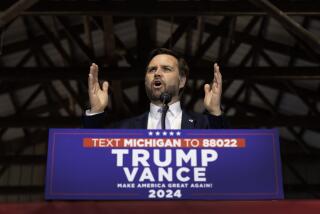Now Bush’s Judgment Is Really in Doubt
- Share via
Samuel Johnson was once asked to comment on a church sermon that had been delivered by a woman. The 18th-Century English aphorist and possible misogynist replied “Sir, a woman’s preaching is like a dog walking on his hind legs. It is not done well; but you are surprised to find it done at all.” So it was on Wednesday night in Omaha, where Sen. Dan Quayle won a victory of sorts by managing to be standing at the bell.
Vice President George Bush’s campaign manager Lee Atwater was quoted as saying that the questions about the stature gap had been answered once and for all, and other Republican shills characterized Quayle’s performance as a trial. It was a Quayle victory in the same sense that Gettysburg was a Southern victory because Lee’s army had been able to escape annihilation at the hands of Meade.
Quayle’s rhetorical one-two combination of resume puffery and vacuous homilies raises again the questions that were asked in New Orleans when Bush put the Indiana senator on the ticket. That these questions get raised is puzzling because the Republican Party is rich in talent at the national level. The conservative wing of the GOP especially is well-endowed with members of Congress and governors who could have reassured voters on the right. There’s a very resourceful group of Republican House members--no more obscure than Quayle had been--who have been jousting with the Democratic leadership for eight years now and have often drawn blood. But Newt Gingrich of Georgia or Robert Walker of Pennsylvania would not have made the mistake of comparing themselves to John F. Kennedy, probably because they are intellectually honest enough to recognize the difference between slender experience and limited aptitude.
If Bush sincerely cared about the social issues over which he professes so much concern, he should have chosen Rep. Henry Hyde of Illinois, a man with a first-rate mind who is the congressional leader of the right-to-life movement. If economic conditions were at the forefront of his considerations about a running mate, there could have been no better choice for Bush than Sen. Phil Gramm of Texas. As debaters, both Hyde and Gramm would have conveyed a sense of substance and gravity. These are politicians who can think on their feet, and if you listen to them you do not hear the sound of briefing-book pages turning in the background or see the seams of the image-makers stitched across their shirt fronts.
But one suspicion that was only hinted at when Bush selected Quayle can now be verified empirically by the American people: He was chosen because there was no danger that he could overshadow Bush. If that was a major criterion for the choice of Quayle--and the Indiana senator’s subsequent public performances raised a strong presumption that it was--the decision indicts Bush as a man so deficient in self-confidence that only a talking dog is a safe ticket mate.
What is implied in such a decision is a gesture of profound contempt for the American people. Bush’s apparent fear of being eclipsed by a running mate who might appear more composed under pressure or solicitous in expression resulted in a vice presidential candidate of breathtaking mediocrity. On three occasions he was presented with the opportunity to provide us with concrete examples of his plans for the nation if the presidency devolved to him. On two of them he pledged to call a staff meeting.
Quayle’s concluding statement was like a rag-tag army of empty phrases parading across a barren landscape. It was as callow and breathless as the remarks of a high school salutatorian and about as presidential as the acceptance speech of the winner of a Miss America pageant. If Nikita Khrushchev was astonished by the lack of sophistication of President Kennedy in Vienna in 1961, one can only imagine what the reaction would be on the part of the wily Gorbachev to meeting Dan Quayle.
It is remarkable how little of the Senate has rubbed off on Quayle. He seems like a figure fixed in time and place: a Friday afternoon in the late 1960s at the “Deke” house at DePauw University. The beer keg has been tapped and Quayle and his fraternity brothers are leaning out of the second-story window leering at co-eds. This is the man that George Bush presents to us to fill the place once occupied by Theodore Roosevelt, Harry Truman and Hubert Humphrey. To say that the job has also been occupied by such obscure mediocre characters as Thomas Riley Marshall, the Hoosier senator whose most memorable policy statement was “What this country needs is a good 5-cent cigar,” does not get Bush off the hook. There was no intercontinental ballistic missile in 1913.
The conventional wisdom holds that vice presidential candidates usually count for little in the calculations by voters about who they will choose for President. That proposition tends to apply when the people in the second spot are of roughly comparable quality. When, however, the person seeking the presidency chooses someone so distressingly shallow and lacking in stature, thoughtful voters will surely hold him accountable.
More to Read
Get the L.A. Times Politics newsletter
Deeply reported insights into legislation, politics and policy from Sacramento, Washington and beyond. In your inbox twice per week.
You may occasionally receive promotional content from the Los Angeles Times.









